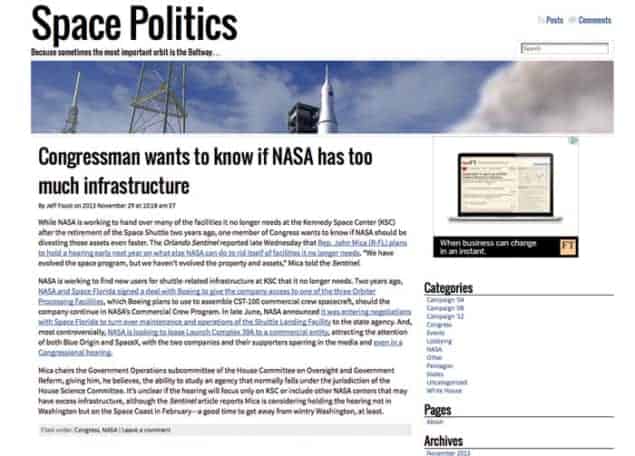
So what is this site about?
As all space scientists know, getting astronauts to the International Space Station or robots to another planet requires more than just technical know-how. It also requires money. And if you want money, it is a truth universally acknowledged that, sooner or later, you’re going to need to deal with politics. This is where the Space Politics blog comes in. Under the tagline “Because sometimes, the most important orbit is the Beltway” – a reference to the ring road that encircles Washington, DC – it offers regularly updated, detailed information about funding, changes to mission timetables and other workings of government that relate to space exploration.
Who is behind it?
Space Politics is the work of Jeff Foust, a journalist and aerospace analyst based in Maryland, US. This isn’t his only project, though: in addition he writes the blog NewSpace Journal, which is dedicated to the space industry’s growing entrepreneurial wing, and edits a weekly online magazine called The Space Review. Oh yes, and he also freelances for other people’s space-related publications and works as an aerospace analyst at a management-consultancy firm. All three of Foust’s space websites are updated with remarkable regularity, and somehow, he still finds time to write a blog about his favourite baseball team, the Washington Nationals. Impressive.
Who is it aimed at?
Although Foust writes clearly in plain English, without too much jargon, you will need to be reasonably familiar with the ins and outs of House and Senate space sub-committees, Congressional Budget Office reports and NASA review panels to understand the importance of the issues that Space Politics covers. And as you may have guessed already, the blog is very US-centric. You won’t find much detailed information here about the internal workings of the European Space Agency, JAXA or the Russian, Indian and Chinese space programmes, although Foust does occasionally report on their activities as they relate to America’s.
Why should I visit?
Funding policy is one of those topics that can seem really boring – right up to the point when it starts to affect something you care about, whereupon it suddenly becomes very interesting. (Kind of like insurance and pensions, then.) Not many people have the patience or the interest to trawl through the minutiae of who said what in yesterday’s meeting of this or that minor committee, but as Foust’s blog demonstrates, this stuff can be hugely important. A good example comes from a post in November 2013 about a report by the planetary science sub &nsash; committee of the NASA Advisory Council. Among other things, this report revealed that budgetary constraints may force NASA to choose between two of its highest-profile missions: the Saturn – circling Cassini and the Mars-roving Curiosity. Ouch.
Can you give me a sample quote?
While attending a conference of the American Institute of Aeronautics and Astronautics in early autumn 2013, Foust wrote about the effects of continued budget uncertainty on the US space community. “‘How many of you know what your budget is going to be next year? Raise your hand,’ said Larry James, a retired Air Force lieutenant general and the new deputy director of JPL… As you might expect, effectively no-one in the audience of several hundred space professionals did. That uncertainty about civil and military space budgets as fiscal year 2014 approaches was a recurring theme at the conference yesterday, where government and industry officials emphasized the ‘changing landscape’ of the industry and the need for innovation. With NASA expected to at least start the fiscal year next month under a continuing resolution (CR), one that could potentially be extended for the full year (just yesterday the chairman of the House Appropriations Committee introduced a CR that runs through 15 December), plus the prospects of another round of across-the-board cuts triggered by sequestration, few at the conference expressed a lot of optimism about the agency’s fiscal situation.”



